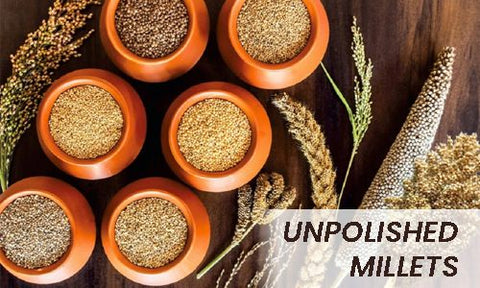Unpolished Millets

Millets are common throughout Asia and Africa and are typically eaten as staple foods. Cereals and bread are the main products made with them. One of the oldest cereals, millets were initially cultivated in Asia 4000 years ago. They were referred to as belonging to the grass family. The Poaceae family, also referred to as the grass family, includes millets, which are cereal grains. Millet, which is naturally gluten-free, provides an abundance of protein, fibre, vitamins, and minerals. These millet grains are very nutritious and are packed with fibre, protein, and antioxidants. Unpolished millets are tiny seeds, and most contain husk on it, which is not edible. However, bajra, ragi and jowar can be used with husk.
1. Little-millet (Samai)
Zinc, calcium, vitamin B, potassium, and other minerals are abundant in little millets. Additionally, they are a wonderful source of fibre, which lowers blood sugar. It contains a lot of fibre and a variety of minerals, including potassium, zinc, iron, and metal. Additionally, it contains vitamin B, which is good for you and acts as an antioxidant when taken.
2. Pearl Millet (Bajra)
Both energy and cell development are protected by pearl millet. Additionally, it is fantastic for boosting immunity. Pearl promotes physical relaxation, fights sleeplessness, and facilitates bowel motions. Bajra, often known as pearl millet, is very nutrient-rich. It includes fibre, protein, iron, and minerals like calcium and magnesium. Regular consumption of pearl millet has several positive effects on your health, including preventing Type II Diabetes.
3. Finger millet (Ragi)
Both toddlers and adults can eat finger millet, which is high in calcium and good for the bones. As a cereal substitute for wheat and rice, try finger millet. The millet kind without gluten has a lot of protein and amino acids. Additionally, it aids children's brain development. In addition, finger millet includes iron, which guards against anemia.
4. Sorghum(Jowar)
Sorghum millet contains a lot of fibre, which helps with constipation, lowers LDL cholesterol levels, promotes strong bones, and guards against heart attacks and stroke.
5. Barnyard Millet (Sanwa)
Barnyard is regarded as the greatest grain substitute for weight loss because it has six times the amount of fibre as wheat. Additionally, fibre prolongs the feeling of being full in the stomach.
What Are The Benefits Of Unpolished Millets?
1. Support Digestion
Millets are high in fibre, which promotes healthy digestion and keeps people feeling satisfied and fuller for longer. Millets include a sizable amount of soluble and insoluble fibre, which controls your digestive process and keeps food from passing through your digestive track too quickly or too slowly. Additionally beneficial for lowering the risk of gallstones is the fibre in millet. Additionally, they are a great source of prebiotics, which promote the growth of probiotics in the gut flora. Millets are often gluten-free, making them the ideal option for those with celiac disease and gluten intolerance.
2. Controls Cardiac System
Consuming millet raises levels of the protein adiponectin, which guards cardiac tissues. Additionally, millets are high in potassium, which lowers blood pressure and aids in controlling the heart's rhythm. It also contains niacin, which lowers oxidative stress in the body and prevents high levels of LDL and triglycerides. Because it is a strong source of magnesium, millet aids in decreasing blood pressure and lowers the risk of heart attacks and strokes brought on by atherosclerosis, a condition in which arteries narrow rapidly as a result of deposits on their inner walls. Significant levels of potassium, another mineral that is good for the heart, are also present in millet.
3. Reduce Your Diabetes Risk
The majority of millets include significant levels of soluble dietary fibre and a low glycemic index, which helps people with diabetes maintain better blood sugar management. Millets are regarded as a superfood for treating type-2 diabetes due to their high magnesium content. Magnesium greatly increases insulin receptor effectiveness and reduces insulin resistance.The presence of the protein adiponectin also results in an increase in insulin sensitivity, which aids in regulating blood sugar levels in the body, particularly in diabetes individuals.
4. Obesity Control
A diet plan for losing weight always includes whole grains that are high in fibre. Millets are no different. Millets lengthen your feeling of fullness and increase satiety. This lessens hunger cravings and prevents you from between-meal munching.
5. Reduction of Oxidative Stress
Millets are also a rich source of antioxidants, which fight free radicals in the body and lessen oxidative stress, hence reducing the risk of developing fatal diseases. According to research, millet consumption can reduce oxidative stress in the hippocampus and slow the progression of Alzheimer's disease. All millet cultivars contain large amounts of polyphenols, a class of phytochemicals with potent antioxidant effects. This antioxidant activity aids in the removal of damaging free radicals from the body and guards against a number of potentially fatal ailments, such as cancer and heart illnesses. Additionally, they strengthen immunity and assist to reduce inflammation.
Where do you get Unpolished Millets in the UK?
Lakshmi Stores UK, the leading grocery store in the UK sells unpolished millets of top graded quality to keep people in the pink of their health. Lakshmi Stores UK sells unpolished millets like Ragi(Finger Millet), Thinai (Foxtail Millet), Brown top millet from the leading brand "Durga". Just a click your desired health will be made possible by Lakshmi Stores, UK at your hands.





